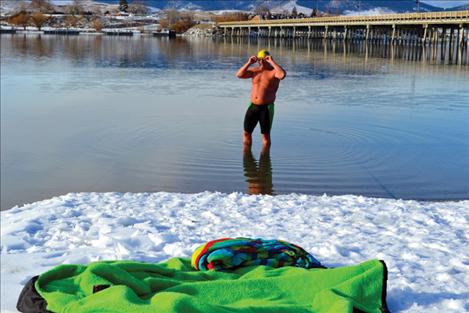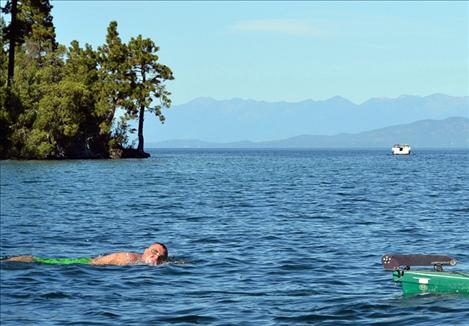Longtime swim coach trains for winter open water events
Hey savvy news reader! Thanks for choosing local.
You are now reading
1 of 3 free articles.
Take a cold shower.
The benefits go far beyond the cliché — improved circulation, learning not to hyperventilate, but most importantly training the brain to accept discomfort as a necessary tool for improvement.
It’s also solid advice for those wanting to train for open water winter swim events.
Mark Johnston, former head coach of the Lake Monsters swim team, enjoys swimming in Flathead Lake. Now. In winter. Without a wet suit — “bioprene,” not neoprene, is what Mark calls it.
It takes “a little bit of crazy, no doubt about that,” Mark said, “Each year it’s a little bit easier.”
Suggested training plans include taking cold showers and ice baths every day. The mind will acclimate, Mark said.
“I suspect he will be taking more cold showers and ice baths to prepare, but he’d rather just jump into a cold lake and swim,” wife Dana said. “He’s hardy.”
Each year that he trains, Mark can tolerate water that’s little bit colder and can swim a little bit further.
“I can jump into 50 degree water and it’s not so bad; like jumping into the shower with only the cold water,” he said.
It’s not just the joy of chilly water motivating Johnson. He’s also training for national and international winter open water swim events.
One such event is the International Ice Swimming Association Ice Mile. Simple rule — swim one mile in 41 degree Fahrenheit water, or lower. There is a catch. Competitors must compete by English Channel rules, which means no wetsuit. Only the common Speedo or knee-length “jammer” suit is allowed.
“Only 90 people have done that,” Johnson said. That represents .0000000012 percent of the globe’s 7.2 billion population. Mark plans to be in that exclusive list.
Mark is an elite swimmer. In 2009, he and a few of his Colorado swimming buddies decided to swim the English Channel from England to France. After a two-year training regimen, the group arrived in Dover. They had a 10-day window to make the 11-hour crossing, but were greeted with water that was so choppy even ferry boats were grounded by the tail of two hurricanes.
“There were gale force winds, and we never got off the beach except to swim in the harbor,” he said. Without the hurricanes, Mark said there was no doubt the group could have completed their goal.
Mark’s next goal is the first-ever sanctioned cold water competition in late February on Lake Memphremagog in Newport, Vermont. Organizers with the United States Winter Swimming Association will cut a rectangle out of the ice to create two 25-meter swimming lanes. Competitions include 25, 50 and 100-meter swims. A 250-meter event will be included if there are sufficient resources to build proper warming facilities for swimmers who will need to recover following a swim of this distance in such cold water, according to the USWSA website.
Mark has purchased his flight, booked his hotel room, and is signed up for all four events.
The water is expected to be 32 degrees Fahrenheit, and the outside air temp between 0 and 25 degrees.
Winter open water swim competitions have taken place throughout Northern Europe and South Africa, but the sport is just now catching on in America.
Mark and Dana, both competitive pool swimmers and longtime coaches, created Flathead Lake Open Water Swimmers (FLOW Swimmers). Mark envisions holding similar open water events on Flathead Lake. He dreams about what Flathead Lake could be, offering year-round swimming competitions and winter carnivals that draw international open water swimmers to the area.
“The Winter Association championship one day could be here, if you can cut 25 meters into the ice … right down at city docks,” he said. “I’m telling you, people would come here to do that if they just knew they could.”
The 28-mile long pristine body of water was what drew Mark and Dana to move from Colorado about a year and a half ago.
In 2003, Dana and Mark volunteered to coach swimming in Denver. They were in such demand that they left their corporate jobs to begin their own USA swim club in 2005. A decade after they first volunteered, the couple sold their business and moved to Polson to be a part of the swim community, coaching Polson’s first swim team, the Flathead Lake Monsters.
Now he’s focusing on the lake.
“Open water swimming is a key component why we moved up here,” Mark said.
Greg McCormick, president of Flathead Lakers, swam competitively in high school and college. From a boat last fall, McCormick kept a watchful eye as Mark swam a 15-mile course that mirrored the swim route of a GPS-collared grizzly bear four years earlier.
“It’s a difficult concept for people to (grasp) that somebody can swim all day,” McCormick said. “It’s kind of a testament to his conditioning and how comfortable he is in the water.”
Yet even in warmer months, open water swimming has risks, and Mark doesn’t take that lightly.
“There’s more to it, certainly, and you have to be safe, and have a plan if you need (help),” Mark said. “You don’t want five people jumping off dock to save you.”
For added safety, Mark straps on a SaferSwimmer®, a bright orange floatation device that floats behind him as he swims. The float makes him visible to boaters and jet skis, and can be used as a floatation device in case of cramps, dizziness or injury. It also can hold items such as first aid kit.
“We lose people to cold weather injuries,” said George Simpson, a Lake County Sheriff’s Deputy dive team leader — and Mark’s swimming friend. From his experience in dive recovery, Simpson recommends the floatation device for open water swimmers. He also warns swimmers to be mindful of the chilly lake temperatures.
“This time of year, it’s the cold. We definitely don’t advise people to swim out there,” he said.
Flathead Lake’s water temperature is cold even in the summertime. Wearing a wetsuit, swim cap and earplugs will help keep the heat in, Simpson said.
But most importantly, Simpson encourages people never to swim in open water alone, even in the summer. If they must, the swimmer should tell someone their route and give them an expected return time.
“You never want to do more than what you are capable of doing,” Simpson said.
What Mark is capable of doing is yet to be seen.
Mark is training to swim the length of Flathead Lake in the summer, and is willing to help other swimmers train during summer months, or even join him on the lake in the winter — in a wetsuit.
“Heck, if you just want to swim in the lake because you like to swim,” Mark said, look him up.
Mark can be reached via email at: coach@flowswimmers.com


















